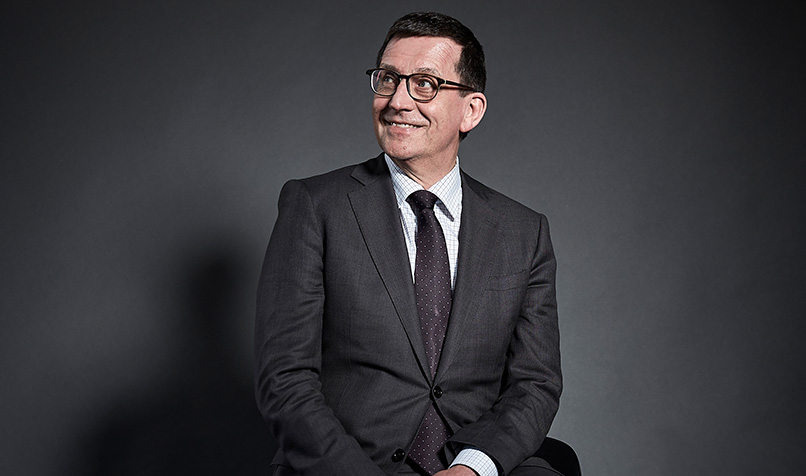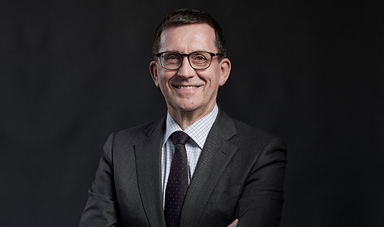Loading component...
At a glance
A large and swanky corner office – preferably with sweeping city views – is often one of the perks for high-flying corporate executives.
Professor Ian Harper is a different breed in that sense, because these days he doesn’t have one, or even want one for that matter. In his words, he prefers to be “out and about”, which goes to the core of his focus as dean of Melbourne Business School (MBS) at the University of Melbourne.
On being appointed the sixth head of the prestigious school in March 2018 and also co-dean of the university’s Faculty of Business and Economics, Harper’s mandate was to re-engage MBS with the university and various major external stakeholders.
MBS is structured as a company that is 45 per cent owned by the University of Melbourne, with 55 per cent of voting rights held by large organisations and individuals who have donated large amounts of money to the school over many years.
“There was some concern at the time that, particularly with the university, relations had not been as strong as they should be between the country’s best university and what is, I would like to think, the country’s best business school,” Harper says.
The 62-year-old was keen to take up the challenge, but had an important proviso. Rather than having one person as dean, Harper insisted that the role be split into internal and external deanships.
The reasoning was simple. One person could not adequately do the role justice and cover every facet of such a complex and important learning institution, which The Economist recently ranked as the number one business school in Australia.
One of his first actions was to appoint Professor Paul Dainty to take over day-to-day management as internal deputy, so Harper could focus more on engaging with external stakeholders.
“It needed to be that way,” he says. “We’re running a system which is quite similar to the experience of the US schools, where the external dean’s role is really to build broad connections for the school into the wider business and academic community.”
Building business bridges
Harper came to the position already very well connected. As a senior economist and academic, his expertise has taken him to the top levels of government and corporate Australia.
A former partner of Deloitte Access Economics, he was appointed a committee member of the Wallis Inquiry into the Australian financial system in the late 1990s, became inaugural chairman of the Australian Fair Pay Commission, and chaired the federal government’s Competition Policy Review.
In other roles, Harper remains a member of the Reserve Bank of Australia (RBA) board, a position he’s held since 2016. As one of nine board members, he has direct influence over Australia’s economic settings at the board’s meetings on the first Tuesday of every month.
"We're running a system which is quite similar to the experience of the US schools, where the external dean's role is really to build broad connections for the school into the wider business and academic community."
In terms of MBS board structure, Harper sits with 16 other directors appointed from within university ranks and also externally. However, his real work is outside the boardroom, where he spends four days a week meeting the deans of other university faculties and external company directors to develop relationships and explore synergies and opportunities for higher education.
For example, he recently met the university’s Melbourne Medical School dean and his team to discuss ways the business and medical schools could work together, such as through building expertise and links with hospitals and medical research facilities. The same types of discussions are happening with other university departments.
Elsewhere, Harper has been active in rebooting links with MBS alumni in Australia and around the world, engaging former graduates to ensure they know the school wants more students and is open for business.
“We’re then following up commercially, given that we have our executive education arm, and that also opens doors for me,” Harper adds.
“Companies [also] approach us to do executive education and part and parcel of that will involve me going and having a talk to the chief executive or the head of HR. It’s about thinking of other ways in which the school could serve a company.”
Business education and lifelong learning

The business education scene has changed markedly over time, with a vast majority of students undertaking programs on a part-time basis and many wanting to complete courses online rather than on campus.
“It is about flexible forms of delivery, with more people coming into and out of the education system at different career stages and requiring different things,” Harper says. “Earlier in the career it is more technical, and later it’s much more about leadership and building organisations.
“If we have the MBA [master of business administration] degrees, stretched right across that spectrum, then we need to do more, certainly with different modes of delivery as well as different emphases on what actually goes into the curriculum, depending on people’s career stages.
“The other thing that people are interested in is a greater degree of specialisation within the MBA. We don’t have any specialised MBA degrees at the minute, but one of the private conversations that I’ve been having with my colleagues in other faculties is how we could introduce more specialisation within the MBA.”
Of increasing importance for businesses is the rapidly growing areas of artificial intelligence and data analytics, and Harper points to MBS working closely with the university’s Melbourne School of Engineering to offer a master of business analytics and a master of analytics management.
The increasing automation of business functions performed by humans is keeping many company executives awake at night, and Harper says businesses of all sizes are leveraging the expertise within MBS to explore its application in modern workplaces.
“It’s about innovation in the type of educational products that we’re producing and the types of programs we’re running,” he says.
“Then, of course, there’s innovation in how it’s delivered. The university has quite a significant investment in wholly online delivery of different programs, including the master of business analytics. You can take it completely online if you wish, through the university’s online facility.”
The human touch in business education
Even so, MBS remains aware that many people come to the school for an active classroom experience.
It is about having your peers engage in your education and you being engaged in theirs, Harper says.
The business school combines its facilities, the talent and input of the academics and the students that are attracted in what he describes as a “virtuous circle”.
“The better-quality students I get, the better-quality staff I attract. The better-quality staff, the better-quality students, and the more appealing and user-friendly my facilities are.”
Added to this are elements of the course experience that take place offshore, such as trips to Asia, or where parts of the program involve working in another institution or on collaborative exercises with peers.
Harper emphasises that while MBS provides digital delivery of materials and tests, there is no way it is working towards displacing the classroom experience.
“Not this business school. We aren’t saying that it can’t be done, nor are we saying that in some sense it doesn’t serve its purpose. This business school is about leveraging the face-to-face engagement of people who are seriously involved in, interested in, ambitious for, business and the stimulus that takes place in the classroom, appropriately curated and supported by digital technology.”
An economic view from the top
Harper has firm views on key economic trends, although he’s quick to emphasise that his own opinions are not necessarily held by the RBA. He has to sing from the same hymn sheet as his fellow central bank members, just as he does in his church, where he pursues a passion for playing the organ and maintaining choral harmony.
On a global level, he points to the strongest coordinated economic upswing since 2006, with most major world economies growing solidly and the lowest unemployment in the US for 40 years.
A weakness is lack of wages growth, which continues to stunt household incomes, although on the positive side it has curtailed inflation to date. The biggest unknown is the impact of rising US interest rates on the US economy and other countries.
"It's about innovation in the type of educational products that we're producing and the types of programs we're running."
“Interest rates in the United States are going to rise and as they rise it will have knock-on implications for the other economies, including [Australia’s],” Harper says.
“We’re already seeing the Australian dollar weaker than it has been, and it may be weaker yet as rates in the United States start to rise against our rates, which for the time being are staying where they are.
“What that will do is produce some further stimulus for us as the exchange rate weakens. In the meantime, there are concerns this pause in the growth of household incomes against the backdrop of consumption, which has continued on its merry way, means that household savings have fallen to very low levels.”
Harper says that without wages growth, combined with low savings and a declining property market, Australians are likely to reduce spending over time, which will start to produce negative effects on the rate of economic growth and spur even stronger reductions in the value of the Australian dollar.
“This process could [happen] quite suddenly, particularly if US rates rise faster than people are anticipating. Stock prices fall faster, asset prices fall faster as we adjust to the end of the low interest rate experience, and that could produce instability in economies as they [also] adjust, but let’s not become too miserable about this. The economy is growing strongly, cities are growing, the population’s growing and people have jobs.”
Reflections on the banking system
Given his role in the Wallis Inquiry over 20 years ago, which helped shape Australian banking regulations, a recent development of keen interest to Harper is the Royal Commission into Misconduct in the Banking, Superannuation and Financial Services Industry.
Reflecting on the Wallis Report’s recommendations to the Howard government, Harper points to the subsequent creation of the Australian Prudential Regulation Authority and Australian Securities and Investments Commission to regulate the system.
“The Wallis committee was very strong on light-touch regulation, and I suppose you’d have to say with the benefit of hindsight that light-touch regulation hasn’t been particularly effective,” he concedes.
“My surprise is that, to date, the regulators haven’t been called to account to a greater extent. Secondly, I suppose I am surprised that the regulatory apparatus didn’t engage in enforcement in the way that we had expected. Yes, we did have light-touch regulation but no one on the committee had in mind that you would just stand idly by and let these things happen – ask people for undertakings and never check.”
Harper says that if he had his time again and found himself considering light-touch regulation as an option, he might instead decide that a more heavy-handed approach was warranted and “throw the book at them”.
Regardless, a tighter or more intrusive regulatory apparatus is still not his first preference.
“We’re going to lose too much in terms of innovation or worse, and what happens is that you just encourage the development of unregulated forms of finance,” he says.
In some ways, this view is reflective of Harper’s current role at MBS, which is to build bridges and pathways – not walls – and to foster innovation across the education and business sectors.

